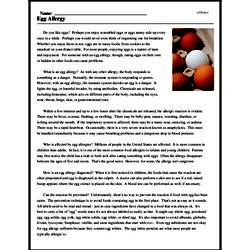Egg Allergy
Do you like eggs? Perhaps you enjoy scrambled eggs or eggs sunny side up every once in a while. Perhaps you would never even think of requesting one for breakfast. Whether you enjoy them or not, eggs are in many foods, from cookies to the meatloaf on your dinner table. For most people, enjoying eggs is a matter of taste and enjoyment. For someone with an egg allergy, though, eating eggs on their own or hidden in other foods can cause problems.
What is an egg allergy? As with any other allergy, the body responds to something as a danger. Normally, the immune system is responding to germs. However, with an egg allergy, the immune system decides an egg is a danger. It fights the egg, or harmful invader, by using antibodies. Chemicals are released, including histamine, which acts on different parts of the body, including the eyes, nose, throat, lungs, skin, or gastrointestinal tract.
Within a few minutes and up to a few hours after the chemicals are released, the allergic reaction is evident. There may be hives, eczema, flushing, or swelling. There may be belly pain, nausea, vomiting, diarrhea, or itching around the mouth. If the respiratory system is affected, there may be a runny nose, sneezing, or asthma. There may be a rapid heartbeat. Occasionally, there is a very severe reaction known as anaphylaxis. This must be handled immediately because it may cause breathing problems and a dangerous drop in blood pressure.




